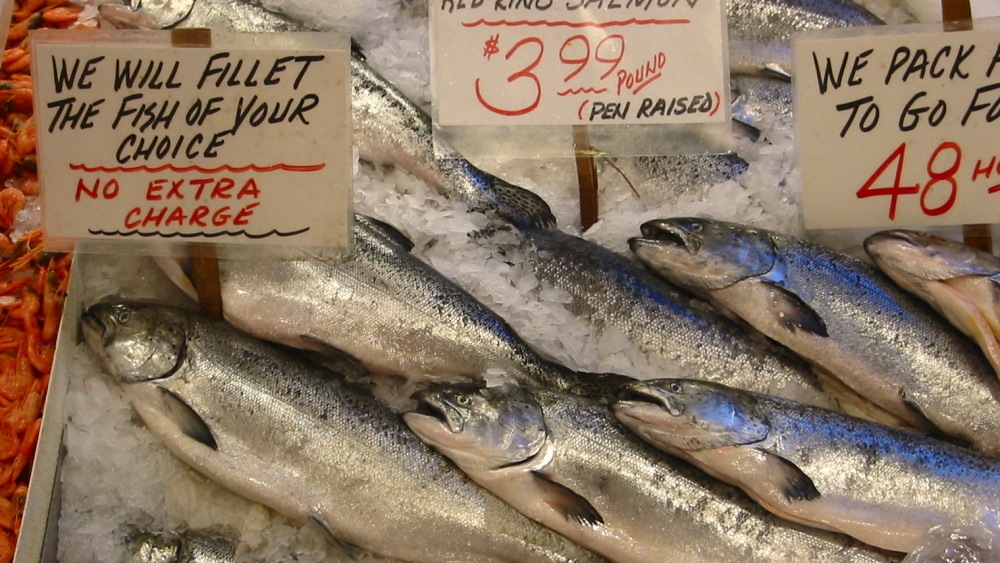By Holly Giles | Deputy Editor
Many of us love tucking in to smoked salmon, but few know the damaging consequences of the salmon farming industry and the effect it has on our climate. A report has been published highlighting the environmental impact of salmon farming, amounting to over $50 billion from 2013-2019 in damage. 
Of particular concern, is the quantity of wild fish used in salmon farms. It is estimated that 20% of the amount of fish caught worldwide each year are used to make fishmeal and fish oil. 70% of this goes to fish farms. This is problematic for fishermen in developing countries whose stock is being depleted by the production of fish oil, in order to boost western fish. 
This high demand leads to overfishing in these areas which leads to decreased fish populations and altered marine biodiversity. This problem is expected to increase in the future through Western plans to increase their farming capacity, meaning demand for fish oil will increase. Scotland has reported a plan to double its farming capacity by 2030, and Norway to increase by fivefold by 2050.
One of the most shocking realisations is that there are other sources of fish oil farmers could use to replace the need for wild fish, such as algae as a source of Omega 3. But according to a report published last week, few farms do so. According to Natasha Hurley, Campaigns Manager at the Changing MArkets Foundation, said: ÔÇ£Moving away from using wild caught fish in food would make salmon farming more sustainable, as it is having a huge impact on wild fish.ÔÇØ
Another worrying component of salmon farming, is the increasing number of fish mortality. This has risen from 3% in 2002 to 13.5% in 2019 with over two thirds of them being unaccounted for. One of the biggest salmon killers is sea lice infestations which is responsible for 20% of fish mortality, but the true number is likely to be higher. Treating this infection and looking at other causes of mortality, is estimated to equate to 60% of the costs behind salmon farming. Being able to treat the infection more efficiently and more cheaply, would reduce fish mortality and increase the sustainability of the sector further. 
A spokesperson from Mowi, the Norwegian company producing 20% of the world’s farmed salmon, said: ÔÇ£We are pleased that the report finds that, when considering the full range of benefits and impacts, the business of salmon farming demonstrates overall positive effect. We agree there are opportunities for continued improvements for our business. The inclusion of small amounts of fish meal and oil is certified sustainable by third parties and integral to salmonÔÇÖs health and welfareÔÇØ.┬á
Whilst the spokesperson recognises there are ÔÇ£opportunities for continued improvementsÔÇØ it is not known when we can expect to see these changes in our largest fish farms. Only when sustainable changes, such as the use of algae for Omega 3, are made across the industry will real change be seen.┬á
However, not all were happy with the report into the detrimental effects of salmon farming, and felt it only told half the story. This sentiment was highlight by a spokesperson for the Scottish Salmon Producers Organisation, who told: ÔÇ£Farmed salmon has a great environmental story to tell – it has the lowest carbon footprint of any main livestock protein, it is a nutritious and healthy food and, as the UN and other international experts have acknowledged, aquaculture provides one of the best solutions to the feeding the worldÔÇÖs burgeoning population in years to come. It is a shame that the authors have chosen to ignore these undeniable benefits when publicising this report.ÔÇØ
Whilst there are two sides to every story, the report provides convincing evidence of the darker side to salmon farming. The report calls for action to make this process more sustainable and it is hoped that, as a result, changes will be made to reduce the impact of our fishing trade in the future.








Add Comment